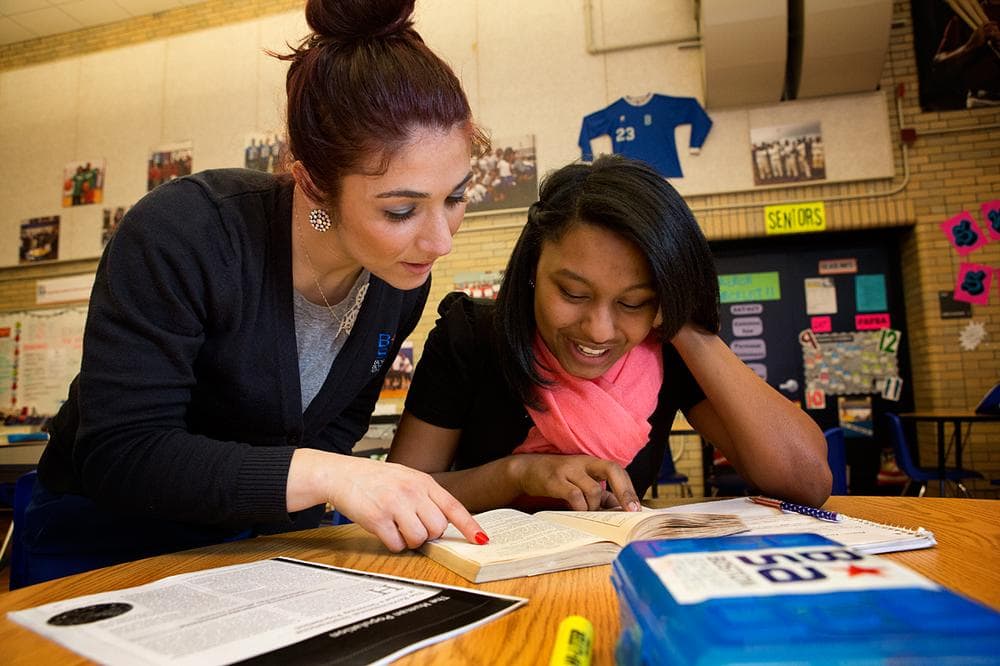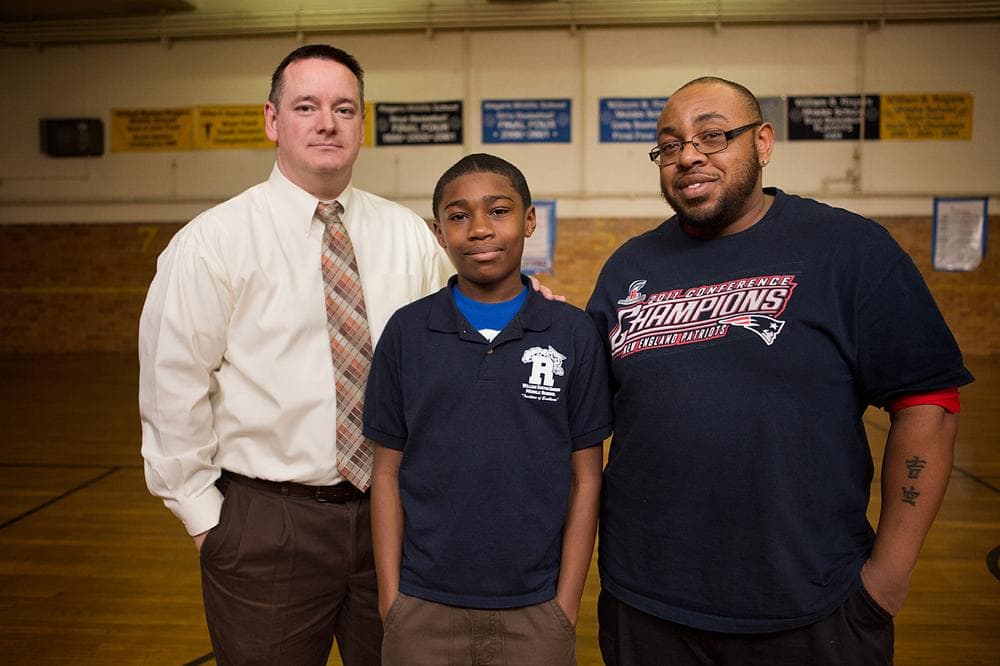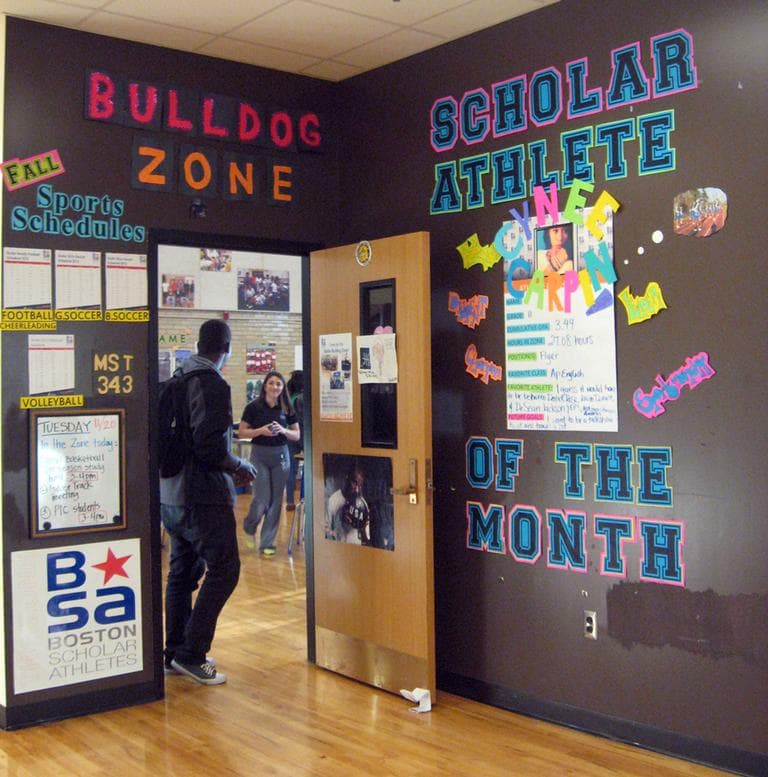Advertisement
Charities Try To Keep Boston Student-Athletes In The Academic 'Zone' Too
Resume
The end of the school day marks the beginning of hours of unsupervised wandering for many of Boston's high school students. But at the Jeremiah E. Burke High School in Dorchester, the Boston Scholar Athletes Zone is ready with pencils, paper and laptops.
“Oh, I love the zone,” said Burke senior Yissa Guerrero. She tries to come to the Boston Scholar Athlete Zone learning center every day, even if she can only stay for a few minutes. “It's like another home. You come in the zone and you get your work done. It's a place where you can have fun, but you are productive.”
Guerrero is being raised by a single mother whom she describes as "beautiful and strong." Her older brothers are in college, but higher education wasn't always Guerrero's plan.
“Before the zone was here I was really not into school so much,” she said. “The zone came in and the zone is the place to be. It brought me up and I stayed up ever since.”
Each learning center is run by a facilitator who acts as a tutor/mentor/champion. The Boston Scholar Athletes staff zones in 19 of Boston's public high schools. Last year, more than 2,500 students were BSA Zone members. Burke High School’s head football coach, Byron Beaman, makes sure his players are among them.
“I like the odds that we have right now, that's for sure,” Beaman said with a laugh. He says teams used to lose half of their players to academic ineligibility every season. “We still have our issues with one or two, but one or two versus 12, 13, 14, 15 — that's a big jump."
As for Yissa, her dedication to the zone has paid off. When she first walked in the door, her GPA was a 2.0. Now it's a 4.09.
Practice-Turned-Study Hall
While academic support may be new to Boston's high school football players, football is new to middle school students. In 2009, the charity Play Ball! began funding a league. But there’s more to it than just football. Tyrese Myers plays for Rogers Middle School in Hyde Park and says soon after the season began his coaches converted Thursday practices into study halls.
"Some of the teachers was complaining that we wasn’t doing our homework,” he said. "So we just got study hall. Do our homework."
Wildcats coach Kasim Shavis said football brought an energy that had been missing at Rogers Middle School.

“Oh, big time, big time,” Shavis said. “You know, I’m the custodian, so I’m all over the building, you know what I’m saying. I mean the third floor to the basement to the cafeteria to the front office, it’s just non-stop football talk.”
Shavis said pride and excitement pushes players to keep up with their homework — and sometimes their teammates’ homework, too.
“You’ll have kids that’ll even tell on somebody in a heartbeat. ‘Hey coach, you need to go talk to such-and-such because he’s not pulling his end in the classroom.’ ‘Oh, really?’ ‘Yeah, I was talking to him.’ You get that type of stuff. It’s pretty cool,” Shavis said.
'It Really Is Like A Family In Here'
Back at the Jeremiah E. Burke High School, zone facilitator Taleen Taylor got everyone settled for afternoon study hall. She looks about 10 minutes older than the kids and she's shorter than most. As she bounced around the room with an iPad tucked in the crook of her arm, Taylor helped with everything from homework to hunger pangs.
“It really is like a family in here and that's why I'm so passionate about it,” Taylor said. “Because I know what athletics has done for me, I can use that experience and share it with them.”
Taylor was a Division I soccer player. She keeps the zone open long past the final bell. And her days start early, too, with personal phone calls to students who have trouble making it to school.
“If they need a phone call, then we'll do that,” she said. “But eventually they have to take responsibility and be accountable."
Tougher Requirements Needed?
The privately funded Boston Scholar Athletes and Play Ball! Foundation are relatively new, but Wildcats football coach Steve Cahill has been teaching math at the Rogers school for 14 years. Cahill said coaching gives kids a chance to see him in a different light and vice versa.

“A joke here, a joke there, you can have a little fun with it. It’s great. It’s great.” But Cahill said the fun is secondary. “We make sure these kids are on task. Whether it be football, whether it be practice, whether it be behavior, whether it be academics, everything whatsoever. They have to be 100 percent on task in order to play.”
Taylor keeps the high school students on task in the zone, too. Students at the Burke don't have homework every day, so she provides them with books to read, college brochures to peruse, and SAT prep questions to study.
Some members, including much of this year's basketball team, used the help offered to reach the minimum eligibility standards for the first time in their high school careers. It sounds like it should be a daunting task, but one senior told us that he had been able to raise his GPA from a 0.0 to a 2.5 in just three weeks.
Both middle schools and the high schools track attendance, grades and behavior. But for some of the students, maintaining a C average isn’t exactly a challenge.
“It’s not really a big deal. It’s just an easy A. You just have to get over a C and you can play,” said Tyrese Myers.
Boston Scholar Athletes leaders have said they would like to see tougher GPA requirements for athletics. Boston Superintendent Carol Johnson said it’s under consideration.
“It misleads students to think that a low grade point average will get them into college or will actually meet any kind of NCAA standard,” Johnson said. “We are reviewing, right now, GPA requirements of other urban districts around the country to see what they have in place.”
Johnson feels strongly that changes should include temporary exemptions for kids who go through a traumatic event at home — something that’s a problem in the school district.
If the district does raise the minimum GPA for athletic eligibility, the BSA officials say the zones will be ready to help. But getting these students on the path to success can be simpler than keeping them there.
WBUR’s “Budgets & Box Scores” series was edited by Martha Little.
This program aired on May 15, 2013.


